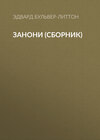Читать книгу: «What Will He Do with It? — Volume 01»
BOOK I
CHAPTER I
In which the history opens with a description of the social manners, habits, and amusements of the English People, as exhibited in an immemorial National Festivity.—Characters to be commemorated in the history, introduced and graphically portrayed, with a nasological illustration.—Original suggestions as to the idiosyncrasies engendered by trades and callings, with other matters worthy of note, conveyed in artless dialogue after the manner of Herodotus, Father of History (mother unknown).
It was a summer fair in one of the prettiest villages in Surrey. The main street was lined with booths, abounding in toys, gleaming crockery, gay ribbons, and gilded ginger bread. Farther on, where the street widened into the ample village-green, rose the more pretending fabrics which lodged the attractive forms of the Mermaid, the Norfolk Giant; the Pig-faced Lady, the Spotted Boy, and the Calf with Two Heads; while high over even these edifices, and occupying the most conspicuous vantage- ground, a lofty stage promised to rural playgoers the "Grand Melodramatic Performance of The Remorseless Baron and the Bandit's Child." Music, lively if artless, resounded on every side,—drums, fifes, penny- whistles, cat-calls, and a hand-organ played by a dark foreigner, from the height of whose shoulder a cynical but observant monkey eyed the hubbub and cracked his nuts.
It was now sunset,—the throng at the fullest,—an animated, joyous scene. The, day had been sultry; no clouds were to be seen, except low on the western horizon, where they stretched, in lengthened ridges of gold and purple, like the border-land between earth and sky. The tall elms on the green were still, save, near the great stage, one or two, upon which had climbed young urchins, whose laughing faces peered forth, here and there, from the foliage trembling under their restless movements.
Amidst the crowd, as it streamed saunteringly along, were two spectators; strangers to the place, as was notably proved by the attention they excited, and the broad jokes their dress and appearance provoked from the rustic wits,—jokes which they took with amused good-humour, and sometimes retaliated with a zest which had already made them very popular personages. Indeed, there was that about them which propitiated liking. They were young; and the freshness of enjoyment was so visible in their faces, that it begot a sympathy, and wherever they went, other faces brightened round them.
One of the two whom we have thus individualized was of that enviable age, ranging from five-and-twenty to seven-and-twenty, in which, if a man cannot contrive to make life very pleasant,—pitiable indeed must be the state of his digestive organs. But you might see by this gentleman's countenance that if there were many like him, it would be a worse world for the doctors. His cheek, though not highly coloured, was yet ruddy and clear; his hazel eyes were lively and keen; his hair, which escaped in loose clusters from a jean shooting-cap set jauntily on a well-shaped head, was of that deep sunny auburn rarely seen but in persons of vigorous and hardy temperament. He was good-looking on the whole, and would have deserved the more flattering epithet of handsome, but for his nose, which was what the French call "a nose in the air,"—not a nose supercilious, not a nose provocative, as such noses mostly are, but a nose decidedly in earnest to make the best of itself and of things in general,—a nose that would push its way up in life, but so pleasantly that the most irritable fingers would never itch to lay hold of it. With such a nose a man might play the violoncello, marry for love, or even write poetry, and yet not go to the dogs.
Never would he stick in the mud so long as he followed that nose in the air.
By the help of that nose this gentleman wore a black velveteen jacket of foreign cut; a mustache and imperial (then much rarer in England than they have been since the Siege of Sebastopol); and yet left you perfectly convinced that he was an honest Englishman, who had not only no designs on your pocket, but would not be easily duped by any designs upon his own.
The companion of the personage thus sketched might be somewhere about seventeen; but his gait, his air, his lithe, vigorous frame, showed a manliness at variance with the boyish bloom of his face. He struck the eye much more than his elder comrade. Not that he was regularly handsome,—far from it; yet it is no paradox to say that he was beautiful, at least, few indeed were the women who would not have called him so. His hair, long like his friend's, was of a dark chestnut, with gold gleaming through it where the sun fell, inclining to curl, and singularly soft and silken in its texture. His large, clear, dark-blue, happy eyes were fringed with long ebon lashes, and set under brows which already wore the expression of intellectual power, and, better still, of frank courage and open loyalty. His complexion was fair, and somewhat pale, and his lips in laughing showed teeth exquisitely white and even. But though his profile was clearly cut, it was far from the Greek ideal; and he wanted the height of stature which is usually considered essential to the personal pretensions of the male sex. Without being positively short, he was still under middle height, and from the compact development of his proportions, seemed already to have attained his full growth. His dress, though not foreign, like his comrade's, was peculiar: a broad- brimmed straw hat, with a wide blue ribbon; shirt collar turned down, leaving the throat bare; a dark-green jacket of thinner material than cloth; white trousers and waistcoat completed his costume. He looked like a mother's darling,—perhaps he was one.
Scratch across his back went one of those ingenious mechanical contrivances familiarly in vogue at fairs, which are designed to impress upon the victim to whom they are applied, the pleasing conviction that his garment is rent in twain.
The boy turned round so quickly that he caught the arm of the offender,— a pretty village-girl, a year or two younger than himself. "Found in the act, sentenced, punished," cried he, snatching a kiss, and receiving a gentle slap. "And now, good for evil, here's a ribbon for you; choose."
The girl slunk back shyly, but her companions pushed her forward, and she ended by selecting a cherry-coloured ribbon, for which the boy paid carelessly, while his elder and wiser friend looked at him with grave, compassionate rebuke, and grumbled out,—"Dr. Franklin tells us that once in his life he paid too dear for a whistle; but then he was only seven years old, and a whistle has its uses. But to pay such a price for a scratch-back!—Prodigal! Come along."
As the friends strolled on, naturally enough all the young girls who wished for ribbons, and were possessed of scratch-backs, followed in their wake. Scratch went the instrument, but in vain.
"Lasses," said the elder, turning sharply upon them his nose in the air, "ribbons are plentiful,—shillings scarce; and kisses, though pleasant in private, are insipid in public. What, still! Beware! know that, innocent as we seem, we are women-eaters; and if you follow us farther, you are devoured! "So saying, he expanded his jaws to a width so preternaturally large, and exhibited a row of grinders so formidable, that the girls fell back in consternation. The friends turned down a narrow alley between the booths, and though still pursued by some adventurous and mercenary spirits, were comparatively undisturbed as they threaded their way along the back of the booths, and arrived at last on the village-green, and in front of the Great Stage.
"Oho, Lionel!" quoth the elder friend; "Thespian and classical,—worth seeing, no doubt." Then turning to a grave cobbler in leathern apron, who was regarding with saturnine interest the motley figures ranged in front of the curtain as the Drumatis Persona, he said, "You seem attracted, sir; you have probably already witnessed the performance." "Yes," returned the Cobbler; "this is the third day, and to-morrow's the last. I are n't missed once yet, and I sha' n't miss; but it are n't what it was a while back."
"'That is sad; but then the same thing is said of everything by everybody who has reached your respectable age, friend. Summers, and suns, stupid old watering-places, and pretty young women, `are n't what they were a while back.' If men and things go on degenerating in this way, our grandchildren will have a dull time of it."
The Cobbler eyed the young man, and nodded approvingly. He had sense enough to comprehend the ironical philosophy of the reply; and our Cobbler loved talk out of the common way. "You speaks truly and cleverly, sir. But if old folks do always say that things are worse than they were, ben't there always summat in what is always said? I'm for the old times; my neighbour, Joe Spruce, is for the new, and says we are all a-progressing. But he 's a pink; I 'm a blue."
"You are a blue?" said the boy Lionel; "I don't understand."
"Young 'un, I'm a Tory,—that's blue; and Spruce is a Rad,—that's pink!
And, what is more to the purpose, he is a tailor, and I'm a cobbler."
"Aha!" said the elder, with much interest; "more to the purpose is it?
How so?"
The Cobbler put the forefinger of the right hand on the forefinger of the left; it is the gesture of a man about to ratiocinate or demonstrate, as Quintilian, in his remarks on the oratory of fingers, probably observes; or if he has failed to do so, it is a blot in his essay.
"You see, sir," quoth the Cobbler, "that a man's business has a deal to do with his manner of thinking. Every trade, I take it, has ideas as belong to it. Butchers don't see life as bakers do; and if you talk to a dozen tallow-chandlers, then to a dozen blacksmiths, you will see tallow- chandlers are peculiar, and blacksmiths too."
"You are a keen observer," said he of the jean cap, admiringly; "your remark is new to me; I dare say it is true."
"Course it is; and the stars have summat to do with it; for if they order a man's calling, it stands to reason that they order a man's mind to fit it. Now, a tailor sits on his board with others, and is always a-talking with 'em, and a-reading the news; therefore he thinks, as his fellows do, smart and sharp, bang up to the day, but nothing 'riginal and all his own, like. But a cobbler," continued the man of leather, with a majestic air, "sits by hisself, and talks with hisself; and what he thinks gets into his head without being put there by another man's tongue."
"You enlighten me more and more," said our friend with the nose in the air, bowing respectfully,—"a tailor is gregarious, a cobbler solitary. The gregarious go with the future, the solitary stick by the past. I understand why you are a Tory and perhaps a poet."
"Well, a bit of one," said the Cobbler, with an iron smile. "And many 's the cobbler who is a poet,—or discovers marvellous things in a crystal, —whereas a tailor, sir" (spoken with great contempt), "only sees the upper leather of the world's sole in a newspaper."
Here the conversation was interrupted by a sudden pressure of the crowd towards the theatre. The two young friends looked up, and saw that the new object of attraction was a little girl, who seemed scarcely ten years old, though in truth she was about two years older. She had just emerged from behind the curtain, made her obeisance to the crowd, and was now walking in front of the stage with the prettiest possible air of infantine solemnity. "Poor little thing!" said Lionel. "Poor little thing!" said the Cobbler. And had you been there, my reader, ten to one but you would have said the same. And yet she was attired in white satin, with spangled flounces and a tinsel jacket; and she wore a wreath of flowers (to be sure, the flowers were not real) on her long fair curls, with gaudy bracelets (to be sure, the stones were mock) on her slender arms. Still there was something in her that all this finery could not vulgarize; and since it could not vulgarize, you pitied her for it. She had one of those charming faces that look straight into the hearts of us all, young and old. And though she seemed quite self- possessed, there was no effrontery in her air, but the ease of a little lady, with a simple child's unconsciousness that there was anything in her situation to induce you to sigh, "Poor thing!"
"You should see her act, young gents," said the Cobbler: "she plays uncommon. But if you had seen him as taught her,—seen him a year ago."
"Who's he?"
"Waife, sir; mayhap you have heard speak of Waife?"
"I blush to say, no."
"Why, he might have made his fortune at Common Garden; but that's a long story. Poor fellow! he's broke down now, anyhow. But she takes care of him, little darling: God bless thee!" and the Cobbler here exchanged a smile and a nod with the little girl, whose face brightened when she saw him amidst the crowd.
"By the brush and pallet of Raphael!" cried the elder of the young men, "before I am many hours older I must have that child's head!"
"Her head, man!" cried the Cobbler, aghast.
"In my sketch-book. You are a poet,—I a painter. You know the little girl?"
"Don't I! She and her grandfather lodge with me; her grandfather,— that's Waife,—marvellous man! But they ill-uses him; and if it warn't for her, he'd starve. He fed them all once: he can feed them no longer; he'd starve. That's the world: they use up a genus, and when it falls on the road, push on; that's what Joe Spruce calls a-progressing. But there's the drum! they're a-going to act; won't you look in, gents?"
"Of course," cried Lionel,—"of course. And, hark ye, Vance, we'll toss up which shall be the first to take that little girl's head."
"Murderer in either sense of the word!" said Vance, with a smile that would have become Correggio if a tyro had offered to toss up which should be the first to paint a cherub.
CHAPTER II
The historian takes a view of the British stage as represented by the irregular drama, the regular having (ere the date of the events to which this narrative is restricted) disappeared from the vestiges of creation.
They entered the little theatre, and the Cobbler with them; but the last retired modestly to the threepenny row. The young gentlemen were favoured with reserved seats, price one shilling. "Very dear," murmured Vance, as he carefully buttoned the pocket to which he restored a purse woven from links of steel, after the fashion of chain mail. Ah, Messieurs and Confreres the Dramatic Authors, do not flatter yourselves that we are about to give you a complacent triumph over the Grand Melodrame of "The Remorseless Baron and the Bandit's Child." We grant it was horrible rubbish, regarded in an aesthetic point of view, but it was mighty effective in the theatrical. Nobody yawned; you did not even hear a cough, nor the cry of that omnipresent baby, who is always sure to set up an unappeasable wail in the midmost interest of a classical five-act piece, represented for the first time on the metropolitan boards. Here the story rushed on, /per fas aut nefas/, and the audience went with it. Certes, some man who understood the stage must have put the incidents together, and then left it to each illiterate histrio to find the words, —words, my dear confreres, signify so little in an acting play. The movement is the thing. Grand secret! Analyze, practise it, and restore to grateful stars that lost Pleiad the British Acting Drama.
Of course the Bandit was an ill-used and most estimable man. He had some mysterious rights to the Estate and Castle of the Remorseless Baron. That titled usurper, therefore, did all in his power to hunt the Bandit out in his fastnesses and bring him to a bloody end. Here the interest centred itself in the Bandit's child, who, we need not say, was the little girl in the wreath and spangles, styled in the playbill "Miss Juliet Araminta Wife," and the incidents consisted in her various devices to foil the pursuit of the Baron and save her father. Some of these incidents were indebted to the Comic Muse, and kept the audience in a broad laugh. Her arch playfulness here was exquisite. With what vivacity she duped the High Sheriff, who had the commands of his king to take the Bandit alive or dead, into the belief that the very Lawyer employed by the Baron was the criminal in disguise, and what pearly teeth she showed when the Lawyer was seized and gagged! how dexterously she ascertained the weak point in the character of the "King's Lieutenant" (jeune premier), who was deputed by his royal master to aid the Remorseless Baron in trouncing the Bandit! how cunningly she learned that he was in love with the Baron's ward (jeune amoureuse), whom that unworthy noble intended to force into a marriage with himself on account of her fortune! how prettily she passed notes to and fro, the Lieutenant never suspecting that she was the Bandit's child, and at last got the king's soldier on her side, as the event proved! And oh, how gayly, and with what mimic art, she stole into the Baron's castle, disguised as a witch, startled his conscience with revelations and predictions, frightened all the vassals with blue lights and chemical illusions, and venturing even into the usurper's own private chamber, while the tyrant was tossing restless on the couch, over which hung his terrible sword, abstracted from his coffer the deeds that proved the better rights of the persecuted Bandit! Then, when he woke before she could escape with her treasure, and pursued her with his sword, with what glee she apparently set herself on fire, and skipped out of the casement in an explosion of crackers! And when the drama approached its /denouement/, when the Baron's men, and the royal officers of justice, had, despite all her arts, tracked the Bandit to the cave, in which, after various retreats, he lay hidden, wounded by shots, and bruised by a fall from a precipice, —with what admirable byplay she hovered around the spot, with what pathos she sought to decoy away the pursuers! it was the skylark playing round the nest. And when all was vain,—when, no longer to be deceived, the enemies sought to seize her, how mockingly she eluded them, bounded up the rock, and shook her slight finger at them in scorn! Surely she will save that estimable Bandit still! Now, hitherto, though the Bandit was the nominal hero of the piece, though you were always hearing of him,—his wrongs, virtues, hairbreadth escapes,—he had never been seen. Not Mrs. Harris, in the immortal narrative, was more quoted and more mythical. But in the last scene there was the Bandit, there in his cavern, helpless with bruises and wounds, lying on a rock. In rushed the enemies, Baron, High Sheriff, and all, to seize him. Not a word spoke the Bandit, but his attitude was sublime,—even Vance cried "bravo;" and just as he is seized, halter round his neck, and about to be hanged, down from the chasm above leaps his child, holding the title-deeds, filched from the Baron, and by her side the King's Lieutenant, who proclaims the Bandit's pardon, with due restoration to his honours and estates, and consigns to the astounded Sheriff the august person of the Remorseless Baron. Then the affecting scene, father and child in each other's arms; and then an exclamation, which had been long hovering about the lips of many of the audience, broke out, "Waife, Waife!" Yes, the Bandit, who appeared but in the last scene, and even then uttered not a word, was the once great actor on that itinerant Thespian stage, known through many a fair for his exuberant humour, his impromptu jokes, his arch eye, his redundant life of drollery, and the strange pathos or dignity with which he could suddenly exalt a jester's part, and call forth tears in the startled hush of laughter; he whom the Cobbler had rightly said, "might have made a fortune at Covent Garden." There was the remnant of the old popular mime!—all his attributes of eloquence reduced to dumb show! Masterly touch of nature and of art in this representation of him,—touch which all who had ever in former years seen and heard him on that stage felt simultaneously. He came in for his personal portion of dramatic tears. "Waife, Waife!" cried many a village voice, as the little girl led him to the front of the stage.
He hobbled; there was a bandage round his eyes. The plot, in describing the accident that had befallen the Bandit, idealized the genuine infirmities of the man,—infirmities that had befallen him since last seen in that village. He was blind of one eye; he had become crippled; some malady of the trachea or larynx had seemingly broken up the once joyous key of the old pleasant voice. He did not trust himself to speak, even on that stage, but silently bent his head to the rustic audience; and Vance, who was an habitual playgoer, saw in that simple salutation that the man was an artistic actor. All was over, the audience streamed out, much affected, and talking one to the other. It had not been at all like the ordinary stage exhibitions at a village fair. Vance and Lionel exchanged looks of surprise, and then, by a common impulse, moved towards the stage, pushed aside the curtain, which had fallen, and were in that strange world which has so many reduplications, fragments of one broken mirror, whether in the proudest theatre or the lowliest barn,—nay, whether in the palace of kings, the cabinet of statesmen, the home of domestic life,—the world we call "Behind the Scenes."
Покупайте книги и получайте бонусы в Литрес, Читай-городе и Буквоеде.
Участвовать в бонусной программе




















